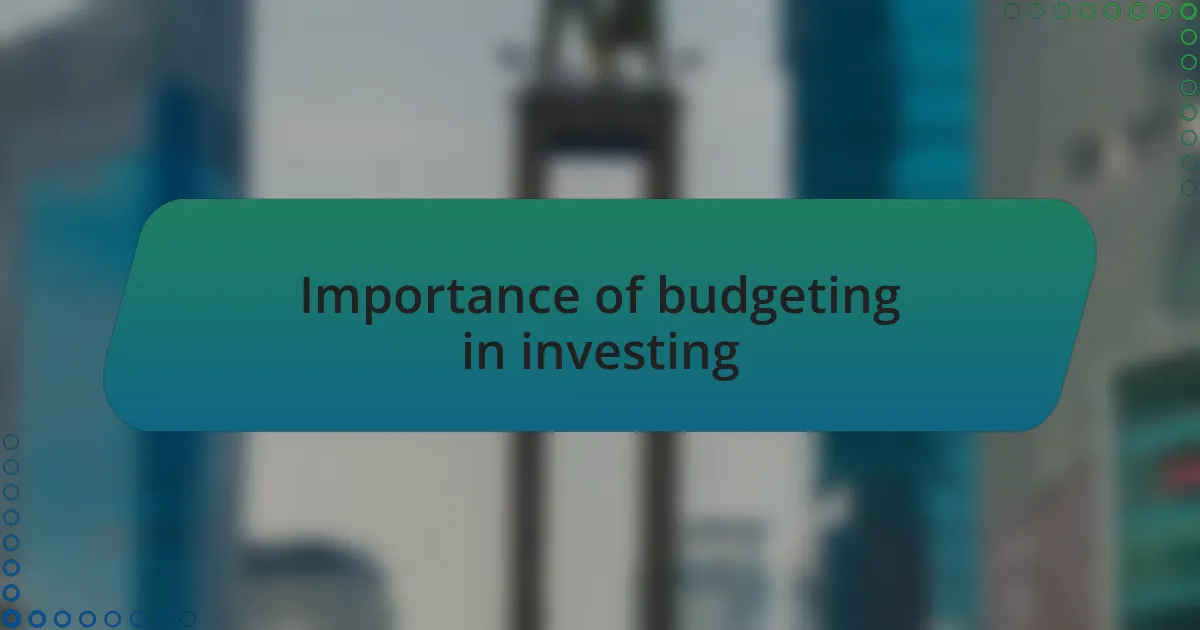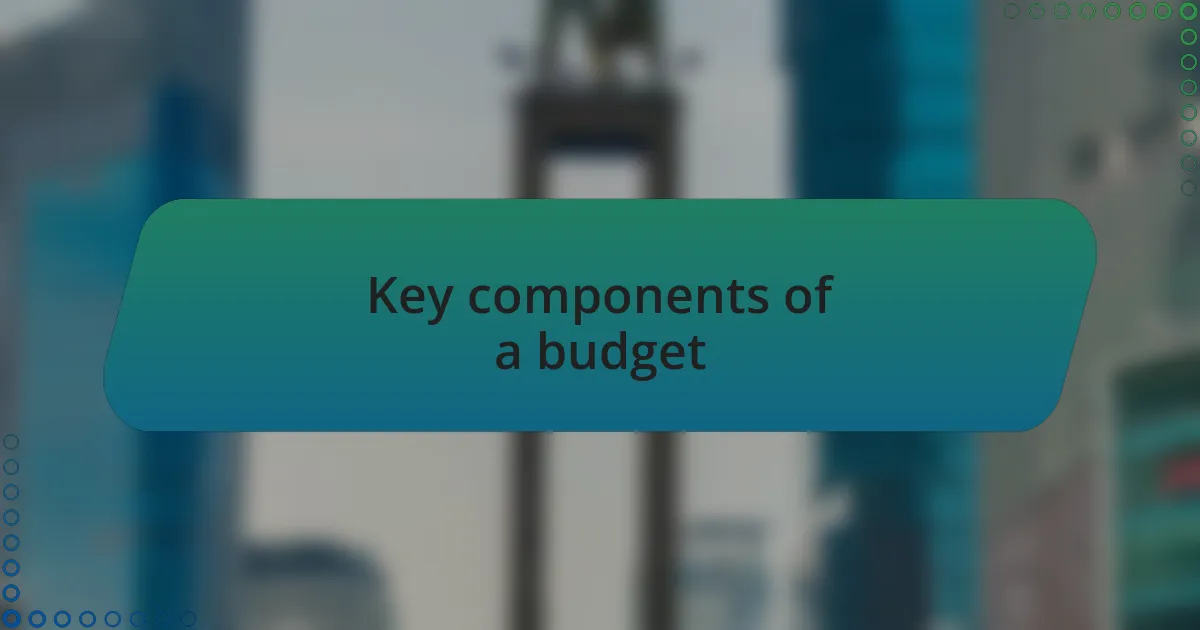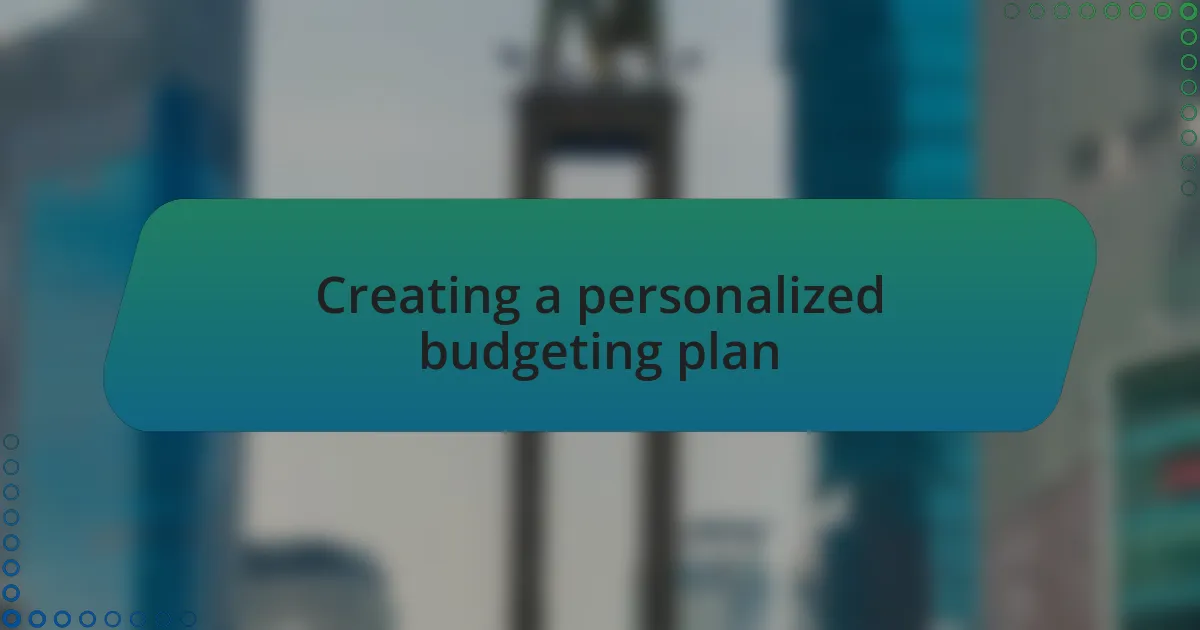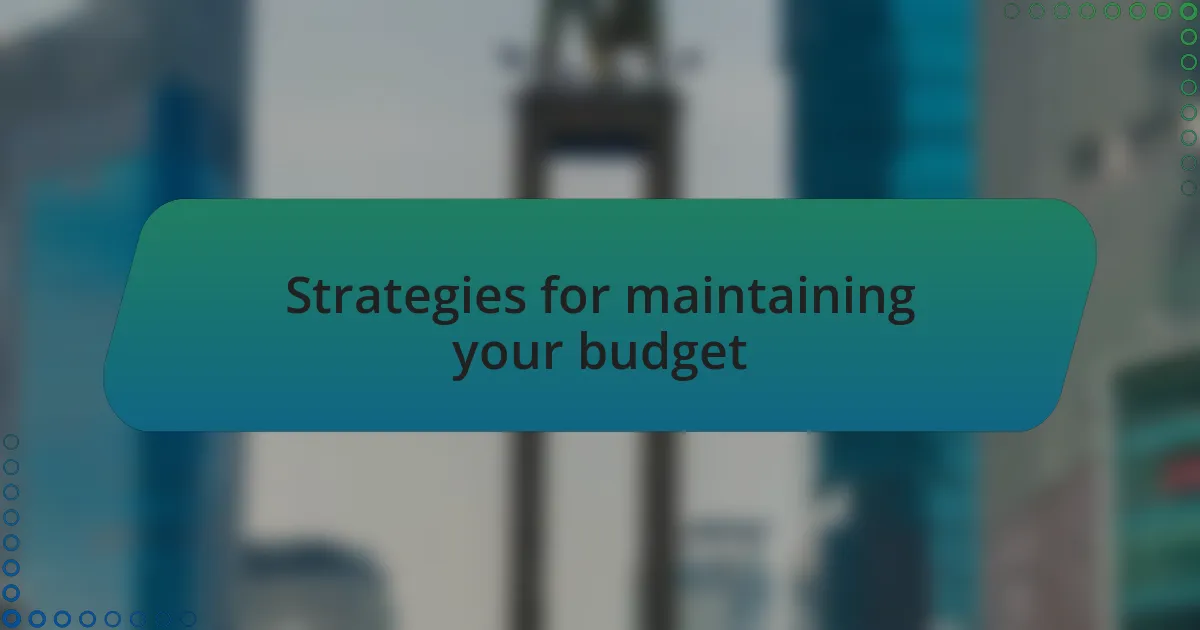Key takeaways:
- Effective budgeting requires a dynamic approach, regularly adjusting for life changes and personal goals.
- Budgeting is crucial for investing, as it helps allocate funds strategically and minimizes emotional decision-making.
- Key components of a budget include tracking income and expenses, setting financial goals, and maintaining an emergency fund for unforeseen circumstances.
- Utilizing technology, creating accountability systems, and rewarding achievements can enhance budget maintenance and foster a positive financial mindset.
Understanding effective budgeting
Effective budgeting is not just about crunching numbers; it’s about aligning your finances with your values and goals. I remember the relief I felt when I first categorized my expenses—suddenly, I had a clearer picture of where my money was going and how it could better serve my life aspirations. Have you ever experienced that moment of clarity where it all just makes sense?
To truly understand effective budgeting, it’s vital to recognize its dynamic nature. Life changes, and so should your budget. I’ve learned to revisit my budget regularly, adjusting for new priorities—like saving for a family vacation or preparing for unexpected car repairs. This flexibility has been crucial in keeping my financial plans realistic and attainable.
Moreover, I’ve found that effective budgeting requires a balance between discipline and flexibility. It’s tempting to rigidly stick to a plan, but too much structure can feel stifling. Reflecting on my own journey, I’ve found that giving myself some leeway in my spending allows for enjoyment without derailing my goals. It’s about asking yourself: how can I make this budget work for me, rather than against me?

Importance of budgeting in investing
Budgeting plays a pivotal role in investing because it lays the groundwork for informed financial decisions. When I first began to invest, I realized how crucial it was to set aside a specific amount of my income for investments, separate from my regular expenses. This clarity not only empowered me to take calculated risks but also minimized the emotional strain that often accompanies financial choices.
Understanding the flow of my finances has made it easier to spot opportunities for investment. I remember scanning through my budget one month and noticing I had extra funds emerging from reduced spending in other areas. That simple realization opened the door to investing in a promising startup that aligned with my values—something I wouldn’t have considered without a well-structured budget.
Moreover, budgeting fosters discipline, which is essential in the world of investing. There have been times when I felt tempted to jump on fleeting investment trends. Reflecting on my budget helped me pause and ask: Is this a sound decision based on my financial goals? This moment of reflection often steers me back to making decisions that are strategic rather than impulsive. By budgeting effectively, I’ve created a framework that supports not just my present lifestyle but also my future wealth-building endeavors.

Key components of a budget
A budget comprises several key components that work together to provide a clear financial picture. At the heart of it are income and expenses—tracking what comes in and what goes out. There was a time when I overlooked minor expenses, believing they wouldn’t make a difference. However, when I started logging every cup of coffee and meal out, the cumulative effect prompted me to rethink my spending habits.
Another vital component is financial goals, which serve as a guiding light for budget allocation. When I set specific investment goals, such as saving for a down payment on a property, I could more effectively structure my budget. I often ask myself, “How will this expense contribute to my long-term aspirations?” This approach not only adds purpose to my spending but also reinforces my commitment to reaching those goals.
Lastly, having a cushion for contingencies—often referred to as an emergency fund—is essential. This was a hard lesson for me. Early on, I faced an unexpected car repair that threatened to derail my budget. Thankfully, I had set aside funds for emergencies, which allowed me to resolve the issue without compromising my investment plans. This safety net is a fundamental component that can safeguard against the unpredictability of life, ensuring I remain on course with my financial journey.

Creating a personalized budgeting plan
Creating a personalized budgeting plan begins with a deep understanding of your unique financial situation. I recall the initial shock of realizing how varied my expenses could be month-to-month, depending on factors like seasonal events and spontaneous trips. It made me question, “What actually drives my spending?” That reflection was crucial; by categorizing expenses and identifying patterns, I tailored my budget to align with my lifestyle while prioritizing my goals.
Next, I find that setting precise, tangible goals plays a pivotal role in your budgeting plan. When I committed to saving for a significant vacation, I felt a renewed sense of purpose each time I tracked my spending. I focused on how each dollar spent affected my vacation fund. This approach not only encouraged mindfulness in my everyday purchases but also made reaching that goal feel achievable and exhilarating.
Lastly, regularly revisiting and adjusting your budget is key. Life changes—new jobs, family additions, or financial obligations can alter your path. For instance, transitioning to a less stable income forced me to reassess my budget frequently. I learned to adapt rather than view changes as setbacks. Each budget review became an opportunity to recalibrate; it was empowering to realize my financial journey was in my control, reminding me of the flexibility essential for long-term success.

Strategies for maintaining your budget
Maintaining your budget requires discipline, but it can also be an opportunity to be proactive with your finances. One strategy I embraced was utilizing technology—apps that track my spending in real-time make a huge difference. They not only remind me of my limits but also give me a quick overview of where my money is going. I often wonder, “How much could I save if I made this a regular habit?” The answer has been significant.
Another effective method I’ve found is to create an accountability system. I decided to share my budgeting goals with a close friend, and it has transformed the way I view my commitments. Whenever I feel tempted to overspend, just the thought of discussing my choices with someone else helps me pause and reevaluate. It’s fascinating how a little outside perspective can shift our mindset, isn’t it?
Lastly, I make it a point to reward myself for sticking to my budget. Occasionally treating myself to something small—a nice meal or a fun outing—provides motivation. It’s about creating a balance, where paying attention to my finances doesn’t feel like a chore. By allowing myself to celebrate small wins, I maintain enthusiasm for my budgeting journey, proving that personal finance can be both responsible and enjoyable.



![Will Chainlink’s [LINK] latest retest flip support into resistance? Will Chainlink’s [LINK] latest retest flip support into resistance?](https://i0.wp.com/ambcrypto.com/wp-content/uploads/2025/04/Renuka-57-1000x600.webp?w=380&resize=380,220&ssl=1)



